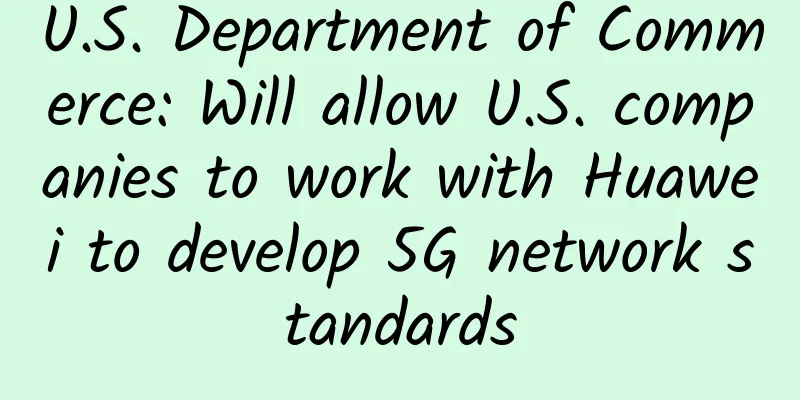U.S. Department of Commerce: Will allow U.S. companies to work with Huawei to develop 5G network standards

|
In the early morning of June 16th, Beijing time, the US government confirmed on Monday that it would amend the ban on US companies doing business with Huawei, allowing them to cooperate in developing next-generation 5G network standards. Reuters previously reported that according to sources familiar with the matter, the U.S. Department of Commerce and other government agencies signed off on the rule change, which is now awaiting publication in the Federal Register, which could be as early as Tuesday local time. U.S. Commerce Secretary Wilbur Ross confirmed reports of the department's upcoming action in a statement to Reuters. The statement said: "The United States will not cede global innovation leadership. The Department of Commerce is committed to encouraging the full participation of U.S. industry and advocating for U.S. technology to become international standards to protect U.S. national security and foreign policy interests." Huawei spokeswoman Michelle Zhou did not immediately respond to requests for comment. The U.S. government last year placed Huawei on the Commerce Department's so-called Entity List, restricting the sale of U.S. goods and technology to the company on national security grounds. Industry and government officials said the rule change should not be seen as a sign of weakening U.S. resolve to restrict Huawei, noting that Huawei puts the U.S. at a disadvantage in setting standards. Because U.S. companies are unsure about what technology or information they are allowed to share, some engineers at U.S. companies have reduced their participation, giving Huawei a greater voice. A person familiar with the matter said the Commerce Department made the amendment to ensure "full participation" of U.S. companies in voluntary standard-setting bodies and respond to concerns from U.S. companies and members of Congress. “The May 2019 Entity List update caused confusion and inadvertently excluded U.S. companies from some technology standards conversations, putting them at a strategic disadvantage,” said Naomi Wilson, senior director of Asia policy at the Information Technology Industry Council, which represents companies including Amazon, Qualcomm and Intel. “This clarification will allow (U.S.) companies to once again compete and lead in this foundational activity that helps roll out advanced technologies like 5G and artificial intelligence across markets,” she added. Kevin Wolf, a Washington trade lawyer, said the amendment "would go a long way toward helping American companies maintain their leadership in international standards organizations without undermining the administration's objectives toward Huawei." In the telecommunications industry, 5G networks are expected to provide the basis for a range of products and services, from high-speed video transmission to self-driving cars. U.S. Secretary of State Mike Pompeo will travel to Hawaii this week to meet with Chinese officials, according to a source familiar with the matter. |
<<: New infrastructure defines the new connotation of data center
>>: China 5G: I have 1G more than 4G, why do so many people still dislike me?
Recommend
What is active monitoring without embedding code? Technology exploration behind improving user experience
In the Internet age, whoever controls the users c...
A400 20% off for the school season, Los Angeles CN2 GIA/9929/4837 and other routes starting from 20 yuan/month
A400 Interconnect recently released a back-to-sch...
What should we pay attention to during the wiring construction of weak current systems?
Wiring construction of horizontal subsystem The h...
Tencent releases StarNet 2.0, increasing AI large model training efficiency by 20%
With the hot and continuous iteration of large mo...
Interview surprise: Why does TCP need a three-way handshake?
The TCP three-way handshake is a classic intervie...
Summary of the State Council Information Office press conference, involving 5G, chips, etc.
[[423758]] On the morning of September 13, the St...
In 2017, the industry cloud finally became a big thing. It is not as simple as cloud + industry!
A reporter once asked many industry customers a q...
Will the next 5G data package be an “unlimited data package”?
In the past two years, 4G unlimited data packages...
Discussion on operator network rectification cost management based on the whole process perspective
[[373761]] With the development of new generation...
Understanding Lossless Networks in One Article
According to OpenAI's data analysis, the amou...
DesiVPS: Los Angeles 1Gbps unlimited traffic VPS from $18.99 per year, India/Netherlands VPS from $20 per year
DesiVPS has released the latest promotional packa...
V5.NET: Hong Kong CN2 (HKTW-B3) limited 30% off, dual E5-2630L/32GB/1T SSD/10M CN2 monthly payment 625 yuan
V5.NET has announced a special event this month, ...
HXServers: $3/month KVM-dual-core CPU, 1GB memory, 60G NVMe, 2Gbps unlimited traffic, Los Angeles/Phoenix data center
HXServers is a new foreign hosting company that o...
my country's network infrastructure already fully supports IPv6
At the 2020-2021 Global IPv6 Development and Outl...









